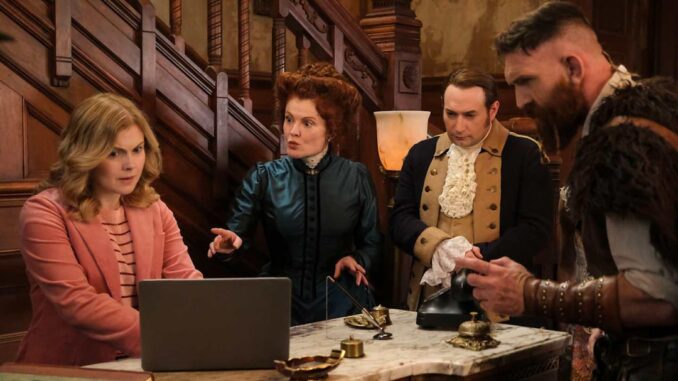
The Ghost in the Machine: When "Sucked Off" Became a Sitcom Sensation
“Sucked off.” Two simple words, conjuring images that range from the innocuous (a refreshing popsicle on a hot day) to the decidedly… not. In the world of network television, especially in the realm of sitcoms, these words are usually relegated to the realm of cable or streaming, whispered amongst characters more comfortable with pushing boundaries. So, when the actor who plays Pete Martino, the eternally optimistic scout leader in the hit CBS sitcom Ghosts, revealed his surprise that the show was allowed to use the phrase "sucked off" in an interview, it wasn’t just a comedic anecdote; it was a glimpse into the delicate tightrope walk between mainstream appeal and edgy humor that defines the show’s success.
Ghosts thrives on the inherent absurdity of its premise: a young couple inherits a dilapidated mansion, only to discover it’s teeming with the spirits of former residents from various historical periods. This quirky ensemble provides ample fodder for humor, but the show's brilliance lies in its ability to navigate potentially controversial subjects – death, societal biases, and the struggles of the afterlife – with a light touch and genuine heart. The moment Pete, accidentally impaled with an arrow while leading his scouts, utters the phrase "sucked off," he's referring, of course, to being literally transported to the next plane of existence, his spirit drawn up and away from the earthly realm. But the double entendre is undeniable, a playful nudge at the audience that acknowledges the absurdity of the situation while staying firmly within the bounds of acceptable broadcast standards.
The actor’s surprise, as he recounts it, highlights the meticulous calculations involved in crafting network television. Every line, every gesture, every comedic beat is scrutinized by network executives, mindful of ratings, advertiser sensibilities, and the overall public perception. For a show to incorporate a phrase with such loaded connotations, even in its most innocuous interpretation, suggests a significant level of trust and a willingness to take a calculated risk. It’s a testament to the show’s clever writing, which uses the inherently funny situation to defuse any potential for offense.
Furthermore, the “sucked off” moment underscores the importance of context in comedy. Had the phrase been delivered with malice, sexual innuendo, or a dismissive tone, it would likely have been deemed inappropriate. Instead, it’s presented as a matter-of-fact observation from a bewildered, well-meaning ghost, stripped of its potential for controversy by the sheer innocence of the delivery. Pete’s earnestness is the shield that protects the joke from being misinterpreted, allowing it to land as a genuine comedic highlight.
The inclusion of this seemingly innocuous yet potentially provocative phrase also speaks volumes about the evolving landscape of network television. While still bound by certain restrictions, shows like Ghosts are pushing the boundaries of what's acceptable, embracing a more sophisticated and knowing sense of humor. The audience is increasingly media-savvy, able to discern between genuine comedic intent and gratuitous offensiveness. By trusting their audience to understand the joke, Ghosts demonstrates a confidence that is both refreshing and rewarding.
Ultimately, the "sucked off" anecdote is more than just a funny behind-the-scenes story. It's a microcosm of the challenges and triumphs of crafting successful network comedy. It highlights the delicate balance between pushing boundaries and maintaining broad appeal, the importance of context and delivery, and the evolving expectations of the modern television audience. The fact that Ghosts managed to navigate this comedic minefield with such grace and humor speaks to the talent of its writers, actors, and producers, and suggests that even in the afterlife, there's always room for a good, slightly naughty, laugh. The ghost in the machine, in this case, isn’t a malicious spirit, but rather a clever joke that slipped through the cracks, reminding us that even the most unexpected phrases can find a home in the heart of mainstream television. And that, perhaps, is the most surprising revelation of all.
